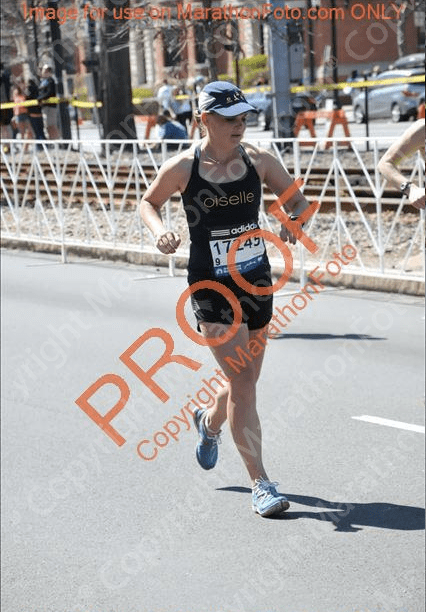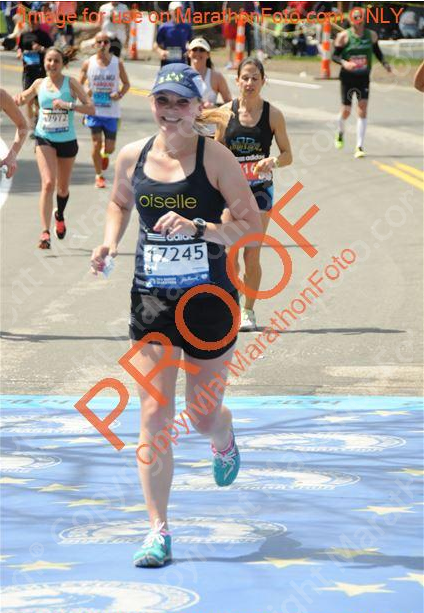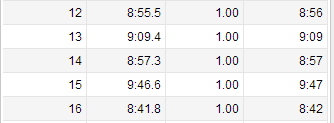If I’m being perfectly honest, I actually have very little recollection on the specific details of the 26.2 miles I ran during the Boston Marathon.
It’s not because I was too tired and cloudy-headed; in fact, the entire time my mental energy was mostly upbeat, and I felt very aware of everything going on around me. But when you have an experience that wasn’t about pace, goals, or PRs as I ordinarily do, something different happens. Or at least, it did for me.
You see, my experience wasn’t really about my race. Because this time around, perhaps for the first time ever, very early on I let go of my always-competitive, tooth-and-nail means of running a race. And in doing so, I became aware of everything else: the other runners, the volunteers, the kids handing out orange slices, the college girls offering kisses, and the millions that came together to make this marathon come to life.
All those factors carried me throughout the Boston Marathon, and when you use as many distractions as you can to pull your aching legs and tired body to the finish line, you tend to forget the nuances of each and every mile.
Let’s see what I can remember though, because it was a special day.
As I’ve talked about perhaps one-too-many times, I went into this race with a lot of self-doubt regarding my running abilities and my stomach’s disabilities. I accepted that it wouldn’t be a great performance by my standards, and I accepted that more than likely it would be a personal-worst time. Knowing those things ahead of time certainly lessened the pressure, but I also envied those with big goals and impressive training.
Nevertheless, I wanted to enjoy the experience no matter what, which is exactly the mentality I woke up with on Marathon Monday. Shockingly, I slept great the night before. Perhaps at least 7 hours, with a few wake-ups here and there. Solid gold by race-eve standards, so I was feeling chipper and excited when it was time to get up and going.
I ate a quiet breakfast by myself before starting to get ready, which was a nice time to really try and relax and focus on the day to come. Before too long though, it was time to suit up in my race kit and all my various throwaway layers and make the short walk over to the Boston Commons with Adam.
I met up with the wonderful Julia and we loaded up on the buses to head out to Hopkinton. I tried not to focus too much on the distance it took to get from Boston all the way to our starting point, but between chatting and admiring the scenery it wasn’t all that bad. Generally, there was an excitement among all the runners, and it was pretty contagious.
Arriving in Hopkinton and heading into Athlete Village was a little surreal; it was something I’d read about and heard about so much before, however to actually be there myself preparing to run the Boston Marathon was a pretty crazy feeling. The Village was totally outfitted with all pre-race necessities, including water, bagels, coffee, and lots and lots of port-a-potties. There were long lines even so, and I feel like a lot of our time was spent waiting in line multiple times.
Here’s where I tell you that despite months of having unhappy and overactive intestinal issues…on race morning, I had nada. Zilch, zero. WTF? While ordinarily this would have been a welcome change, it was not part of my “maybe I won’t have to stop a lot” race plan. My biggest fear going into this marathon wasn’t the hills or the distance…it was urgently needing to make pit stops. I’d gone over lots of bad-scenarios in my head, and none of them were pretty at all. Needless to say, this lack-of-activity I was experiencing on race morning wasn’t a good sign.
The show needed to go on though, and knowing there would be plenty of places to stop along the route helped ease my mind. Those none-goals I already had? Yea, they became much more lax given this new factor.
Enough already, let’s get to the race.
Once the B Wave was called to the start line, we all headed out, I made one more bathroom attempt (fail) and there was no turning back: it was time to run the Boston Marathon!
It all seemed to happen faster than I anticipated. All of a sudden, there was the start line, lots of television cameras, screaming fans, and holy shit…we’re running!
The first few miles felt very downhill, as expected. I’d heard over and over again that going out too fast was the surest way to screw up during Boston, so I drilled it into my head to not do so. I dialed it back, watched people fly past me, and did everything I could to feel really comfortable and relaxed. Of course, still, these miles ended up being my fastest overall, although the 8:35-ish pace I was holding felt so slow. It was really nice to be cruising so comfortably though, and I tried to soak up the atmosphere and be as present as possible.
The whole time, though, I was worried about my stomach. Full disclosure: recently when I’ve been running, the urgency comes on without much warning and very quickly, so I was really hyper-aware of where the upcoming aid stations would be. It was around mile 6 or so that I decided to duck into a bathroom for the first time. I’m not going to provide the details of every stop (there were 5 of them total) but none were necessarily satisfying, and I ran the entire race with a good deal of bloat and some unwelcome cramping. Love you, Crohn’s.
Lucky for me, there were plenty of distractions along the way. Every time we entered a new small town, the sides of the roads were completely lined with cheering people. In fact, I would say that 95% of the course had people supporting all the runners, and it was pretty unbelievable. I noticed early on that wearing your name on your shirt was a huge crowd-pleaser, and I think it would have been helpful to have had my name on me somewhere. Although I did get a fair amount of “Oy-sell!,” “O-sell!,” and my personal favorite, “Go Giselle!”
Regardless, the energy from the onlookers was palpable, and I definitely used their encouragement to keep me motivated.
I don’t remember much between miles 6-10, except that it was getting warm. I’ve definitely said this too many times, but I am NOT a fan of running in hot weather. Not one little bit. It’s the reason I typically dislike spring marathons (disregard the fact that I’ve run 3 of them now). I was happy for my tank top and shorts and remembering to wear sunscreen, but I could tell that the heat was going to take its toll on the race. The road was fairly exposed the whole time, and there wasn’t a cloud to be seen. Lovely for a spring day, not lovely for running a marathon.
I was paying marginal attention to my pace, but mostly to make sure I was staying comfortable and not running too fast too soon. I was around 9 minute miles which felt really smooth, although it was hard to guess exactly since I had stopped already and didn’t know how that had affected my pace.
After mile 10, I began to notice that my quads, specifically my left quad, was feeling a little sore. Fantastic. I had heard so many times of those downhill beginning miles taking their toll later on, but I suppose I didn’t really believe it until it snuck in all at once. Of course, my downhill training was nonexistent, but even still I figured that I might be spared since I started off conservatively. Wrong. Sad.
I began focusing on checkpoints, since I started to get overwhelmed by the thought that I wasn’t even halfway done. I thought about getting to mile 13, since that’s where Wellesley would be with all the screaming college girls I’d heard so much about. After that I thought about getting to 16, since I’d heard that if you feel good at 16, you’d have a good finish to the race. I didn’t exactly feel “good” at this point, but my spirits were still high and my legs still felt (mostly) strong.
Right on cue around mile 13, all the Wellesley girls showed up in full-force, and it was awesome. They were so enthusiastic, so encouraging, and hilarious. I appreciated all of their signs and watched many of my fellow runners accept their kisses. I myself opted to stay on the shaded side of the road, but I definitely blew the girls a few kisses. It was really fun to see that tradition, and the whole time I kept thinking that college girls look really…young. Has it really been 4 years since I was there?
It was time now to focus on 16, since thinking that I still had the entire second half to go was too overwhelming. Ordinarily, I really like reaching the halfway point in a marathon, but this time I had more a feeling of dread than one of “it’s all downhill from here!” My legs were definitely feeling tired, specifically my quads, and I knew the hills were coming soon. And it was hot. I took another bathroom stop around this point, and decided to start taking water at every aid station instead of every other. I had a system where I’d grab two waters, slurp most of one down, and throw what I had left on my shoulders and my back. The temporary relief from the sun was very welcomed.
I kept pressing on, pretty oblivious to my Garmin. I don’t know if it was denial or the fact that I truly didn’t care, but I just didn’t want to do the math of predicting paces and finishing times. I knew I’d be slowing down on the hills, and I knew I’d be stopped more at the bathrooms, so I suppose that I just didn’t want to add the mental exhaustion of hoping for a certain time.
After mile 17, I was really excited that I was into single digits in terms of miles left to go. Even so, the thought of running so much longer was daunting, and I knew the best mode of operation would be to stay in the mile I was in. It became a systematic game of, “Okay, get to 18.” Then at 18, I would take my short walk break through the water station, gather myself up, and repeat the whole process over again. I’ve never really needed to go mile-by-mile that early in a marathon, but it was necessary on Monday.

A direct contradiction to “not paying attention to my Garmin.” Busted Broker! I swear this was one of a handful of times 🙂
Between my precious water stops, I did everything I could to stay distracted and stay in the moment. I’d written “Be Here” on one of my wrists that morning, and I really tried to focus on remembering the fact that I was running the Boston Marathon. It was never lost on me how cool of an experience it was to be having, and I thank the spectators for that in large part. They never stopped reminding me of the pride that’s held for this race and its runners. Multiple times I heard, “Thank you for running!” and saw signs like, “You make us Boston Strong,” which was such an incredible reminder of the honor it was to be running the race. There would be moments where I was so enamored with the energy of the crowd that I’d temporarily forget my wavering stomach and my fatigued legs.
The hills of Boston begin in Newton, and while I didn’t really think they were anything to write home about, they definitely do not come at a welcome time. My quads were getting more tired by the mile, and when we started on the uphills I focused a lot on trying to get different muscles to engage. Regardless, each uphill was met with another downhill, and I had to accept that the true marathon pain wasn’t going away. On my other wrist I’d written “embrace” which was supposed to be a reminder to embrace the pain when it came. This was that time, and I knew it would be a battle to the finish.
I’m pretty sure I tried using a bathroom again around mile 21 (as evidenced by the stellar pace below), but it’s all kind of blending together at this point. Like I said, there were 5 total stops, one of which was useless since the person using the singular port-a-potty decided to take their sweet time and I bailed after over a minute of waiting. That was a little blood-boiling.
Heartbreak Hill came during mile 20, and I didn’t actually think it was too bad. Sure, my pace sucked big time and my legs were dying, but the people were incredible and carried me up the entire way. I discovered that smiling and acknowledging the crowd was the surest way to solicit some cheering, and I smiled as much as I could up that hill. Heartbreak was definitely one of my checkpoints though, as I knew the bulk of the climbing would be done after it was over.

A fairly accurate representation of how I felt from miles 16-26.1. I’m also convinced this was on a hill which makes my form a little more excusable…yikes.
I was still playing my “stay in the mile” game, and it had turned into, “Just get to mile 22…23…etc” I think I managed to trick my brain this way, especially since I’d surrendered to walking every aid station we came by. In part, I felt a little lazy since I’d never done this before, but more so I think it was necessary to keep my energy up and to keep my head in the game. Quite simply, I just wasn’t in shape enough nor prepared for the heat enough to fight through the pain of those miles, and without a goal other than to finish…why suffer more?
If miles 21-24 were a chug-a-long fest, I’d say that I started to rise in spirits when we got to mile 24.5 or so. The crowds were thick and loud, and knowing I had less than 2 miles to go was encouraging. Anything more than that had seemed demoralizing before that, but now I started to feel the excitement of finishing. While I didn’t have a lot of doubt that I would finish the race, I realized early on that I would be completely heartbroken if for some reason I wouldn’t be able to finish. That thought was motivation enough to push through, no matter how slow it felt.
And slow it was. I knew my pace had dropped considerably and my form was nowhere to be found. But I kept smiling, and it was hard not to with the support of the cheering crowds. I tried to focus a lot as well on the other runners around me. Thinking that we’d all taken on this journey together was a really moving thing, and I tried to take in the moment of being one of the people who were nearing our way to the Boston finish line. After mile 25, I vowed to ignore my desire to walk, push the pain aside, and take in the rest of the race. I remembered my mantra that the marathon is supposed to be hard, and that’s why it’s so great. Channeling that internal motivation didn’t stop me from grabbing a grape ice-pop from a little boy at this point though…desperate times, man. And oh baby did that taste good.
Approaching the right turn onto Hereford, I started to get really excited. Excited to be done, obviously, but excited to experience the moment that 5 months ago I didn’t think was possible. I remembered how running this race was just a dream to the girl who was too sick to leave the house, and how I owed it to her to savor and love every moment of the finishing stretch. I drew so much energy from the crowds, and despite how slow I may have been moving and how tired my legs were, I don’t really remember feeling anything other than joy.
The left turn onto Boylston was euphoric. It was the picture that kept me motivated through these past few months of frustrating runs, and to see it in real life was the most beautiful and satisfying thing. I soaked it all in, smiled at every face I saw, and choked up a bit when I finally saw my fiancee cheering for me near the finish line. After a few more strides, the blue paint came into view and I had made it: I was a Boston Marathon finisher!
I stopped my watch and looked at the cumulative time for the first time since the halfway mark. 4:08, an average pace of 9:25/mile, and over 20 minutes slower than I’d ever run a marathon before. But I couldn’t have cared less. My heart was so full, and I was so happy to have just been a part of a race that was so much bigger than the time on the clock or the outcome of individuals.
Afterwards, it was fairly standard post-marathon procedure: I received my medal (a highlight!), was draped in my finisher’s cape, and very, very slowly made my way toward the exit. Luckily, I didn’t really feel sick or light headed much at all, but my legs were like bricks. I met up with my cheering crew, and Adam and I made our way back to our temporary apartment to rest, shower, etc. Climbing the two flights of stairs to get to the apartment was laughable.
The rest of the day isn’t all that exciting. I took an ice bath (big self-pats on the back for that one), laid on the bed in a curled up ball for a while, and made all necessary phone calls to my family. I was completely overwhelmed with the amount of support I’d received throughout the day, and I floated like a cloud throughout the rest of the night.
Soreness, stomach, and personal-worst times aside, this was an incredible experience. I felt so honored to have been a part of such a historic race, and the outpouring of love for one another was an incredible thing to witness. This race was a true testament to the glory of the marathon; the demonstration of the power of the human spirit. This glory was glowing throughout every runner, fan, and volunteer out there, and it was a beautiful thing to witness.
Thank you all so much for your support over these past several months and this past weekend. This community has been an incredible source of comfort and strength for me through the good times and the bad, and I couldn’t be prouder to be a part of it.
 Congrats to all who participated in Boston on Monday!!!
Congrats to all who participated in Boston on Monday!!!


























